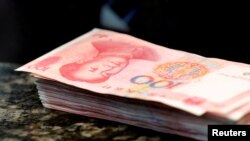China this week established the first clearing center for the Chinese yuan, or RMB, in the United States. The move is seen by some as a signal China wants to take on the dollar on its home turf.
But there is more than a sense of bravado behind the decision. This is a crucial time for the RMB, which is struggling to stay on course while preparing to enter the coveted currency basket of International Monetary Fund's Special Drawing Rights (SDR) on October 1.
In financial terms, there was no reason to establish an RMB clearing center as the U.S. market can easily be serviced through dedicated RMB centers in other parts of the world.
"But it sends the signal that China wishes to enter the U.S. financial markets with RMB business to challenge the U.S. dollar on its home turf, so to speak," Jacob Kirkegaard, a senior fellow at the Washington-based Peterson Institute of International Economics told VOA.
"As such, this is more a political signal than a financial necessity," he said. "This is because the RMB rate is an intensely political figure and essentially can be taken as a proxy for 'faith in the Chinese economy.' "
No celebrations
Chinese officials have undergone years of toil and entered into more than 20 currency swap agreements to give the RMB a global image. But they are not going to sip wine and declare "gan bei" (bottoms up, in Chinese custom) over the yuan's entry into the IMF's basket for SDR a few days later.
Christopher Balding, associate professor at HSBC School of Business Peking University, said China is desperately trying to keep the RMB from crashing by spending $50 billion a month. Beijing is selling dollars out of its reserves to buy up the available yuan in the international market, he said.
"If they [Chinese officials] went on national TV and announced that they would let the market fully determine the value of the RMB, I don't think it is a stretch to say that the RMB will drop 15-20 percent in the blink of an eye," Balding told VOA.
"China's foreign investment is down 40 percent. When you couple that with the continued amount of money leaving China, that is putting a lot of pressure on the RMB," he said.
Beijing is actually de-internationalizing its currency by sucking out the available yuan in the world markets."If they [Chinese currency] are declining at the rate they are now, there will be no RMB available outside China in 18 months," he said.
Battle for stability
China's recent policy to keep the currency’s value roughly stable has been driven by its desire to avoid sharp currency moves in the lead-up to the G-20 summit that took place in China recently, and, now, the forthcoming inclusion of the RMB in the IMF’s SDR basket, according to Eswar Prasad, senior professor at Cornell University and author of an upcoming book, Gaining Currency: The Rise of the Renminbi.
"China’s government faces a conundrum that other reserve currency economies have faced in the past - how to promote the currency’s role in global finance without losing control over the currency’s value," Prasad said, adding, "Currency management policies over the last year suggest that the government sees stability in currency markets as a higher priority than promoting the currency’s international role."
China's currency moves are not meant to protect or push forward its exports. Chinese exporters are not likely to gain hugely by a slide in RMB value or lose much if it was a little stronger, because many of them face little competition in the price and quality range in which they operate, experts said.
"China is most interested in maintaining basic stability of its currency and limiting volatility. Reducing expectations of substantial or sudden depreciation helps reduce capital outflows," said Scott Kennedy, deputy director of the Freeman Chair in China Studies at the Center for Strategic and International Studies. "The recent modest depreciation is not geared to support exports."














